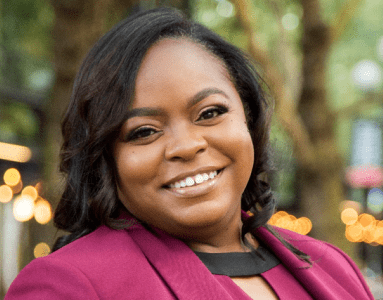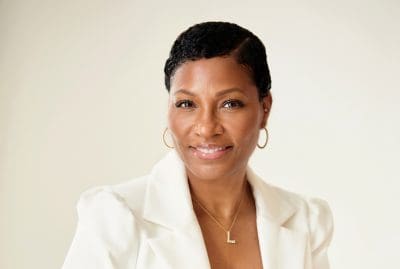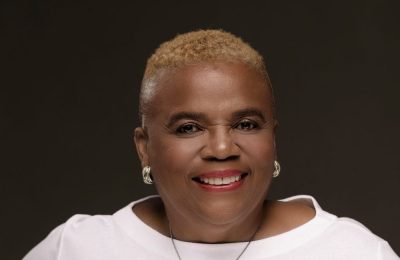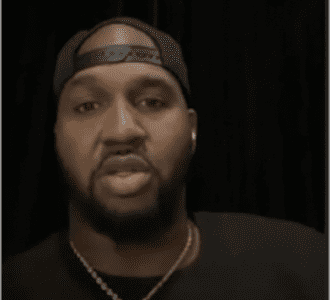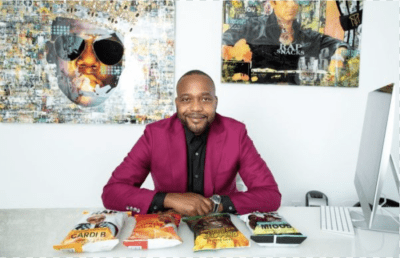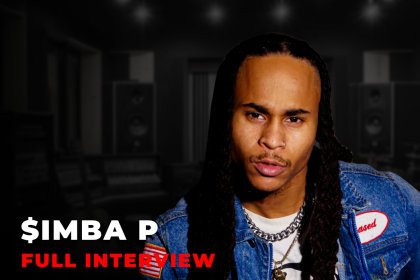Will Campbell is the CEO of Quantasy, a Los Angeles-based creative agency. Campbell’s vision for blending advertising, technology, entertainment and culture has made him one of those right thinkers who has created business growth for world-class brands including Google, Honda, Acura, Magic Johnson, Kevin Hart and others.
Alongside his work with top-tier organizations, Campbell serves as chairman of the Quantasy Foundation, the philanthropic arm of Quantasy and as a commissioner on the Los Angeles County Small Business Commission. Munson Steed, the publisher at rolling out magazine, caught up with Campbell to engage in an enlightening conversation, the substance of which we have captured here.
Munson Steed: Hey, everybody! This is Munson Steed, and welcome to another edition of CEO to CEO, where you get the insights, you know, you might have a fantasy, or it might be a Quantasy, or you might be a creative individual who wants to understand what it is to run an ad agency, a creative agency and be a CEO. So, because you wanna know that and you should know that, and you should have access to individuals, and CEOs who are doing it for big companies. I got my brother, Will Campbell. Hey Will. What’s happening? CEO of Quantasy.
Will Campbell: What’s up, sir? Thank you for having me. It’s great! Good to see you.
MS: You know. When was that moment that you knew, you needed to be “the” CEO?
WC: It’s interesting, man. I’ve always done things in an entrepreneurial way and then creating this business. It was really about the work first. I started with a partner, and we kind of started to grow it. And so, I kind of took the role of leadership and having this vision, without really thinking about, I wanna be the boss, or I wanna be the CEO, or anything like that. I sort of ended up in the role just by pushing the vision forward. Before we knew it, we were growing, growing, and growing, and until finally I attached the acronym to what I was doing. But, but, truth be told, we were just creatives trying to build a business when it first started. And then ultimately, it was like, Okay, I guess I’m being the CEO here and attached that to the name.
MS: So you think about being a CEO and processes? What have you learned as a CEO of a creative agency that has allowed you to be able to grow and sustain?
WC: I think the No. 1 thing that I’ve learned is that leadership is a service. And so, I’ve talked to other aspiring entrepreneurs or people that wanna create businesses and they say they wanna be their own boss. And they wanna control their schedule, and that’s nothing like what it means to be a CEO. As a CEO, you sort of report to everybody. You report to your clients. You report to your vendors and your partners, and importantly, you report to your team members and your staff and your employees. And what I’ve found, to answer your question, is when you take the role of what I call service leadership, or what might be known as service leadership, and you find yourself in service of the people that are helping to grow your business, then you find success. So I think that the main thing that I’ve learned is, the role of CEO as a position of service.
MS: Let’s go down that road. You’ve got a client, you’ve gotta be of service. What does it take to be able to grow those clients for a young brother? Who’s never been in the rooms, and he never has heard of words like RFP, RFI. What does it take for him and give him some insight on what it really means to impress a client or have what it takes to get that RFP awarded to your company?
WC: I think there’s a lot of things that are table stakes, that a lot of people aspire towards. And so they think about things like good creative ideas, strong process, some level of experience and resume. But the number one thing that wins business, is when you can bring a client information that they don’t already have. When you can bring them an insight that they didn’t already know and open their eyes to something. Now that can come from many different areas in my business, it’s usually for us an insight about culture, and we’re able to say, Hey, here’s what’s happening. Here’s what’s brewing. Here’s what’s next. And we’re able to push our clients a little bit further forward. We deal with a lot of large corporations and some startups. And with all the data they have and all the access to information they have. It’s important that we make ourselves valuable by bringing them something that they don’t already have. You and I will call those insights, cultural acumen, those kinds of things. But that’s what wins business, tell them something that they don’t already know.
MS: You sit down and you think about blueprint. Young brothers really imagining that they’re going to be Jay-Z. Where do we need more CEOs of color to really be thinking about playing? Where is the field that we need them to be thinking about? And where would you like to see more young CEOs thinking about right now?
How young CEOs can become right thinkers
WC: That’s a great question, Munson, and I think first and foremost. I think the playing field is open, but what I do like to encourage young CEOs to think about, or what I consider what you might call frontier territories. These are sort of like the areas of where society is heading. And I think that there are a few key things that are here for the long term. Obviously, technology is important. I also think about the areas of sustainability. Really understanding sustainable business practices, I think is really important in terms of where things are going. And then, the last one that I think about is health and wellness. And coming out of a pandemic, coming out of a time of massive isolation, living in a world where social media is literally damaging people’s mental health. Spaces where we are helping people succeed and get better and have stronger mental health is gonna be another big big space. So I think those are what I consider frontier spaces that entrepreneurs should really take a look at how those fit into their business.
MS: Thanks for that. When you look at the dynamics of being a CEO, and you think about the very factors of where you’re gonna get information. But that young brother that might be in Mississippi or Alabama, has never seen Pasadena, isn’t gonna go anytime soon. How would you suggest they scan the universe? What should they be reading? That you may not have been introduced to when you first got into business, that you know about. How can they scan and get their information palette about getting insightful stuff that you do every day?
WC: Yeah, I mean look, I think that there’s the expected way, which is important, and a lot of tools that has to be a part of your repertoire. The things like artificial intelligence and Internet and searches, and all of these platforms where you can connect with others, discord, and you name it. But honestly, I think the key to being able to really get insights is partnerships. If you’re in Alabama, it’s who can you develop synergistic partnerships in different spaces in the country, in the world, globally. How can you create a network that has an exchange of information? Where you’re building relationships. And then, when you’re talking to somebody from California, you’re able to get more of a human perspective on what that’s like and what’s happening there. And you’re able to offer more about where you’re coming from. And oftentimes those relationships lead to business and transactions. But really, it’s about building that network and thinking about it across the country, across the globe. And I think that’s something that every entrepreneur should be thinking about just in terms of getting information, is talking to people.
MS: When you say that, icebreakers, networking tools that you use. What are some of the best icebreakers that a brother, who, or a sister, obviously may not be in the space that you’re in, corporate America. How can they? And how should they show up? And what are some of the icebreakers that they can utilize?
WC: Two things. One is free advice. A lot of people think, “Oh, my brain power is my net worth. And I don’t wanna tell. I don’t wanna give up the game. You gotta pay me as a consultant. You gotta do this, that. But when you’re able to just be helpful to somebody and just say, “Hey, I see what you’re doing at rolling out. I love it. I have a friend you should meet. I have an advertiser that I think you guys should just connect.” It doesn’t have to be transactional. It’s … here’s somebody I think you should connect with. You’re going to turn around and do the same thing later, right? Because it’s a no-strings-attached opportunity. So that kind of free advice, how can I be helpful? Is always a great icebreaker.
One, two, I think, get curious. If you know you’re gonna be in a room with certain people, do your research and get curious. If I know that I’m gonna be seeing Munson Steed in an event, then I’m gonna and I wanna work with a company like his. I’m gonna brush up on the information and I’m gonna and I’m gonna talk to you about rolling out and say, Hey, man, how did you create this? How did you? How did you start this? Or I read the article that you had about Magic Johnson and the Super Bowl picks, and what made you think about those kinds of things? Solid business folks would be happy to share that information with you. Those are icebreakers. You can just walk up to somebody and say, “Aren’t you Munson Steed? I was looking at your platform, and I noticed XYZ. And I, and I think those are the things. So it’s kind of do that homework first but that’s a great way in to building relationships.
MS: Studying, getting advanced degrees, MBAs. There’s a rumor where you decided to tiptoe through a few of those kind of spots, to get a education. Why is getting advanced education important?
WC: For me, education has always been important. Since I was a child, it was something that my parents had really, really encouraged and pushed for me. So I’ve always had a value for education. That being said, there’s no one path to success. There are many people that are hugely successful, multiple degrees. There are many people that are hugely successful, with no degrees. Vice versa, there’s many people that have a lot of degrees that haven’t had success. So, it’s not a prerequisite to success. But it’s an amazing, incredible tool in your arsenal. There’s a level of discipline that comes with education that helps you understand how to digest information, how to distill it, how to utilize it. There’s a level of collaboration and insight around being around other really smart people, teachers and professors, and there’s a level of accountability that school requires. That just helps you sharpen your tool set. So I’ve found education to be hugely valuable in the process of being an entrepreneur.
MS: You almost took me there, and you’re whole G! But for that young brother [or] sister that has never walked in and doesn’t understand the value of being in a room where people are talking about a case study, or professors who’ve written books, how do you distill that into yourself? So you’re able to have those tools and see going through this rigorous training as a tool.
WC: It’s like anything but man, preparation is key. If you are Jay-Z, he has prepared himself for the spaces that he’s going to be in when he’s creating his music. He has stories in his mind that he’s ready to tell. When you’re an athlete, you know, you don’t just show up on the field or the court one day. You practice, practice, practice, you shooting free throws after the game. You’re in the weight room. You’re running those heels. It’s all about preparation. So as an entrepreneur, it’s what is the intellectual weight room that you’re gonna put yourself in? That’s the key of that discipline of learning and practicing and trying. And for an example, a case study, you know. I had a young man that I hired and the minute… I knew I was going to hire him, even though he didn’t have a ton of experience. He gave me an example of the way that he thought about something, and I thought it was brilliant. And I’m like, this kid knows how to think. And that was basically a mini-case study, is him showing, here’s something that I’ve done before. Here’s how I’ve prepared. Here was the last thing that I did, and you have to be able to have those things in your belt. You know, when you’re that, when you get ready to go play ball in college, they wanna know. What’s your vertical jump? How much do you bench? You know all those things. So you gotta be able to have those intellectual statistics for yourself as well.
MS: Your favorite part about being a CEO when you’re next to another one, what is that?
WC: Learning from one another and planning for opportunities together. So, when I’m with another CEO, I love to just hear about growth, hear about challenges, hear about what this person’s learned, and try to absorb as much as I can. And then, I love doing deals. I love making one plus one equal 3. I love saying, Look, I have this, and you have that, and here’s a way for us to grow. And that doesn’t have to be transactional, but when you’re like-minded and like-missioned. There’s always something that can come out of it. So I love talking about, how can we build together?
MS: In the outset, you have this opportunity to go give a graduation speech to Howard, Fisk, Morehouse. What would the title of your graduation speech be? And what would you challenge them to do?
Campbell: Right thinkers learn ‘don’t be rigid’
WC: That’s a good one! I think my graduation speech would be about flexibility, and I think, as an entrepreneur. or just as someone who is choosing to be successful. Being able to see the landscape of what’s happening, think about that against your dream and your destination but be open minded, and flexible to how you get there. Can’t be rigid in your thought. There’s so many things happening. There’s so much change of information, new technologies, things are changing every day. Be open minded to what’s coming towards you and I think that for me has been a real key to success.
MS: Cool! Last thing. Sayings that you use that keep you motivated. What are two that you tell yourself every day?
WC: So, there’s one saying that I think it’s really important. And it is, “What matters more than how we see people is how people see themselves.” And that’s become a guide for me, because whenever I’m interacting with somebody. It’s important to understand the world through the lens they see it. There’s a old image that’s funny to me and It’s a picture of a cat, and the cat’s looking in the mirror, and sees a lion, which I think is a dope image. But the point being, you can’t talk to that cat like it’s a cat when it sees himself as a lion. You have to give that cat the respect that you also see him as a lion, and that’s where the opportunity will come in terms of building a bond with somebody.
So, before you put labels on somebody, before you say, “Oh, this person is this or this person is that ,” you have to understand how do they see themselves? And that’s how I wanna interact with them. So, I think that’s probably a little bit long but that’s the first one. The second one is, ask new questions. Always ask new questions. Keep asking why and that’ll always lead you to something good . When you’re having a conversation with somebody, understand and digest as much as you can when you’re reading and researching. Understand and digest as much as you can, so always ask questions before you just show up with answers.
MS: All right. Well, ladies and gentlemen, you heard it first here. A dear, sincere CEO, who’s changing the world, creating a voice for those who are voiceless. In the midst of this huge transition called the Land of CEO. I appreciate you. It’s really been great, Will. Appreciate all the vision that you share with our community and the gang, and the gifts that you dropped here. Ladies and gentlemen, my thanks to Will Campbell, CEO of Quantasy.
WC: Thanks so much. Much appreciated.


